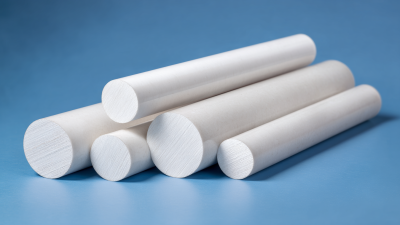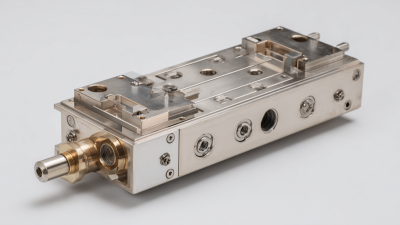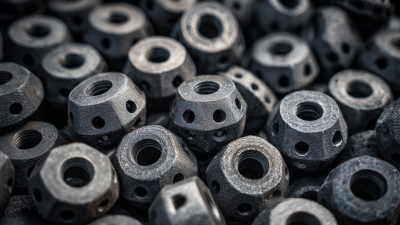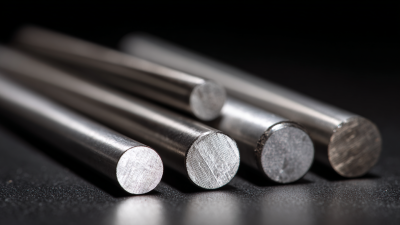How to Choose the Right Zirconia Dowel Pins for Your Manufacturing Needs
Table of Contents
- Understanding the Importance of Zirconia Dowel Pins in Manufacturing Processes
- Key Factors to Consider When Selecting Zirconia Dowel Pins
- Comparing Different Types of Zirconia Dowel Pins: Which is Right for You?
- Top 5 Applications of Zirconia Dowel Pins in Various Industries
- Common Mistakes to Avoid When Choosing Zirconia Dowel Pins
- FAQS
- Conclusion
- Related Posts
Choosing the right Zirconia Dowel Pins is crucial for manufacturing efficiency and product longevity. As industry reports indicate, the demand for high-performance precision ceramic components, such as Zirconia Dowel Pins, is expected to grow at a compound annual growth rate (CAGR) of 7% through 2025, driven by advancements in technology and increased applications across various sectors. ST.CERA CO., LTD. stands at the forefront of this evolution, leveraging its expertise in precision ceramic manufacturing to meet the diverse needs of modern industries. With a dedicated team of top-ranking experts and engineers, our focus on research and development ensures that our Zirconia Dowel Pins provide exceptional strength, wear resistance, and thermal stability. Understanding how to select the right dowel pins not only enhances product performance but also influences the overall efficiency of your manufacturing processes.

Understanding the Importance of Zirconia Dowel Pins in Manufacturing Processes
 Zirconia dowel pins play a crucial role in manufacturing processes, particularly in applications requiring high precision and durability. Made from zirconium oxide, these pins offer superior strength and wear resistance compared to traditional materials. According to a report by Freedonia Group, the global market for advanced ceramics, including zirconia components, is expected to reach $120 billion by 2026, driven by their increasing adoption in automotive and aerospace industries. This reflects a significant shift towards materials that enhance the reliability and longevity of manufacturing tools.
Zirconia dowel pins play a crucial role in manufacturing processes, particularly in applications requiring high precision and durability. Made from zirconium oxide, these pins offer superior strength and wear resistance compared to traditional materials. According to a report by Freedonia Group, the global market for advanced ceramics, including zirconia components, is expected to reach $120 billion by 2026, driven by their increasing adoption in automotive and aerospace industries. This reflects a significant shift towards materials that enhance the reliability and longevity of manufacturing tools.
In addition to their mechanical properties, zirconia dowel pins also demonstrate excellent thermal stability and chemical resistance, making them ideal for harsh industrial environments. A study published by the American Ceramic Society highlights that zirconia can withstand temperatures exceeding 1000°C, which is essential for processes involving extreme heat or corrosive substances. The ability to maintain structural integrity under such conditions not only improves the efficiency of manufacturing operations but also reduces the frequency of part replacement, significantly lowering overhead costs. Therefore, understanding the unique advantages of zirconia dowel pins can lead manufacturers to make informed decisions that enhance production quality and sustainability.
Key Factors to Consider When Selecting Zirconia Dowel Pins
When selecting zirconia dowel pins for manufacturing needs, several key factors should guide your decision. First and foremost, consider the material's properties. Zirconia is known for its high strength and fracture toughness, making it ideal for applications requiring durability and reliability. Additionally, evaluate the pins' resistance to wear and corrosion, as this will impact their longevity and performance in various environments.

Another critical aspect is the dimensional accuracy of the dowel pins. Precision in size and shape ensures proper fit and alignment during assembly, reducing the likelihood of operational failures. Assess the manufacturing process of the pins as well; advanced techniques like computer numerical control (CNC) machining can enhance accuracy and consistency. Lastly, take into account the cost-effectiveness of the options available. While high-quality zirconia dowel pins may come at a premium, the long-term benefits in terms of reduced maintenance and operational efficiency can justify the investment.
Comparing Different Types of Zirconia Dowel Pins: Which is Right for You?
When it comes to selecting the right zirconia dowel pins for your manufacturing needs, understanding the various types available is crucial. Zirconia ceramic materials are highly regarded for their exceptional hardness and resistance to wear, making them ideal for applications in demanding environments. According to a report by Research and Markets, the global market for advanced ceramics, including zirconia products, is expected to reach $121 billion by 2026, growing at a CAGR of 7.9%. This data highlights the increasing reliance on advanced materials in modern manufacturing processes.
Different grades of zirconia dowel pins offer varying properties. For instance, fully stabilized zirconia pins provide superior toughness and compressive strength, making them suitable for applications that experience high mechanical stress. On the other hand, partially stabilized zirconia pins may be more cost-effective while still delivering adequate performance in less demanding environments. A study published in the Journal of Materials Science indicates that the choice between these types significantly impacts the overall performance and longevity of the manufactured components, with fully stabilized options showing a 30% improvement in durability tests.
Ultimately, selecting the appropriate zirconia dowel pin depends on understanding the specific demands of your application, including load conditions, environmental factors, and budget constraints. In-depth consideration of these aspects will ensure that you make an informed decision, enhancing your manufacturing efficiency and product quality.
How to Choose the Right Zirconia Dowel Pins for Your Manufacturing Needs
| Type | Diameter (mm) | Length (mm) | Max Temperature (°C) | Application |
|---|---|---|---|---|
| Standard Zirconia Dowel Pin | 3.0 | 30 | 1200 | General use in precision machinery |
| High-Temperature Zirconia Dowel Pin | 4.0 | 50 | 1500 | Applications in extreme heat environments |
| Precision Zirconia Dowel Pin | 2.5 | 20 | 1100 | Used where tight tolerances are necessary |
| Coated Zirconia Dowel Pin | 5.0 | 60 | 1300 | Enhanced wear resistance for moving parts |
Top 5 Applications of Zirconia Dowel Pins in Various Industries
Zirconia dowel pins have become increasingly popular in various industries due to their exceptional properties, such as high strength, corrosion resistance, and low thermal conductivity. These attributes make them suitable for a range of applications. One of the most prominent uses is in the medical field, where zirconia pins are utilized in dental prosthetics. Their biocompatibility ensures that the pins can be safely used in procedures without adverse reactions.
In the electronics industry, zirconia dowel pins play a vital role in precision alignment and assembly of components. Their resistance to wear and electricity allows for reliable performance in high-demand environments. Additionally, the automotive sector benefits from zirconia pins in applications requiring high durability, such as in engines and transmissions. Lastly, the aerospace industry employs these pins for lightweight yet robust fastening solutions, contributing to overall fuel efficiency while ensuring safety standards are upheld.
Common Mistakes to Avoid When Choosing Zirconia Dowel Pins
When selecting zirconia dowel pins for manufacturing, it's crucial to avoid common pitfalls that can lead to inefficiencies and increased costs. One frequent mistake is choosing pins based solely on price rather than the specific requirements of the application. Lower-cost options may compromise on quality, leading to premature wear or failure during operation. It's essential to evaluate factors such as the desired precision, the environmental conditions they will face, and the compatibility with the materials involved in the assembly process.
Another common misstep is neglecting to consider the size and fit of the dowel pins. Accurate dimensions are paramount for ensuring proper alignment and functionality. Clients often overlook the importance of measuring the pin holes correctly, which can lead to issues with assembly and overall performance. Additionally, failure to test the chosen dowel pins in a controlled environment before full-scale production can result in unforeseen complications. Taking the time to carefully assess these aspects will ultimately enhance the reliability and efficiency of the manufacturing process.
FAQS
: Zirconia dowel pins are made from zirconium oxide.
Zirconia dowel pins offer superior strength, wear resistance, thermal stability, and chemical resistance compared to traditional materials.
Zirconia dowel pins are commonly used in the medical, electronics, automotive, and aerospace industries.
They are biocompatible, making them safe for use in dental prosthetics without adverse reactions.
They are utilized in high-durability applications such as engines and transmissions, improving performance and longevity.
Their high strength, corrosion resistance, and ability to withstand extreme temperatures and corrosive substances make them ideal for harsh conditions.
The global market for advanced ceramics is expected to reach $120 billion by 2026.
Their ability to maintain structural integrity under extreme conditions reduces the frequency of part replacement, lowering overhead costs.
They are used for precision alignment and assembly of components, providing reliable performance in high-demand environments.
Their lightweight yet robust nature allows for effective fastening solutions that support fuel efficiency while ensuring safety.
Conclusion
Zirconia dowel pins play a crucial role in various manufacturing processes due to their exceptional strength, wear resistance, and precision. Selecting the right zirconia dowel pins can significantly enhance the efficiency and quality of production. When choosing these components, it's essential to consider factors such as the specific application, material compatibility, and tolerances. Different types of zirconia dowel pins are available, each suited to particular manufacturing needs, which can further impact the performance and longevity of your products.
In industries ranging from electronics to automotive, zirconia dowel pins are utilized for their durability and reliability in assembly processes. However, it's easy to overlook critical aspects when making a selection. By understanding common mistakes and avoiding them, manufacturers can optimize their operations. St.Cera Co., Ltd., as a leader in precision ceramic manufacturing, is well-equipped to provide insights and high-quality zirconia dowel pins tailored to meet diverse industrial requirements.
Related Posts
-

The Ultimate Guide to Zirconia Ceramic Rods: Unveiling Key Properties and Market Trends
-

5 Reasons Why the Best 4 Inch Ceramic End Effector is a Game Changer
-

Ultimate Guide to Sourcing the Best Sic Wafer Arm for Your Manufacturing Needs
-

7 Essential Tips for Sourcing the Best Silicon Carbide Bushing Globally
-

7 Best Ceramic Lift Pins for Enhanced Performance in Manufacturing
-

The Future of Innovative Ceramic Cylinder Solutions for Global Trade
Blog Tags:

